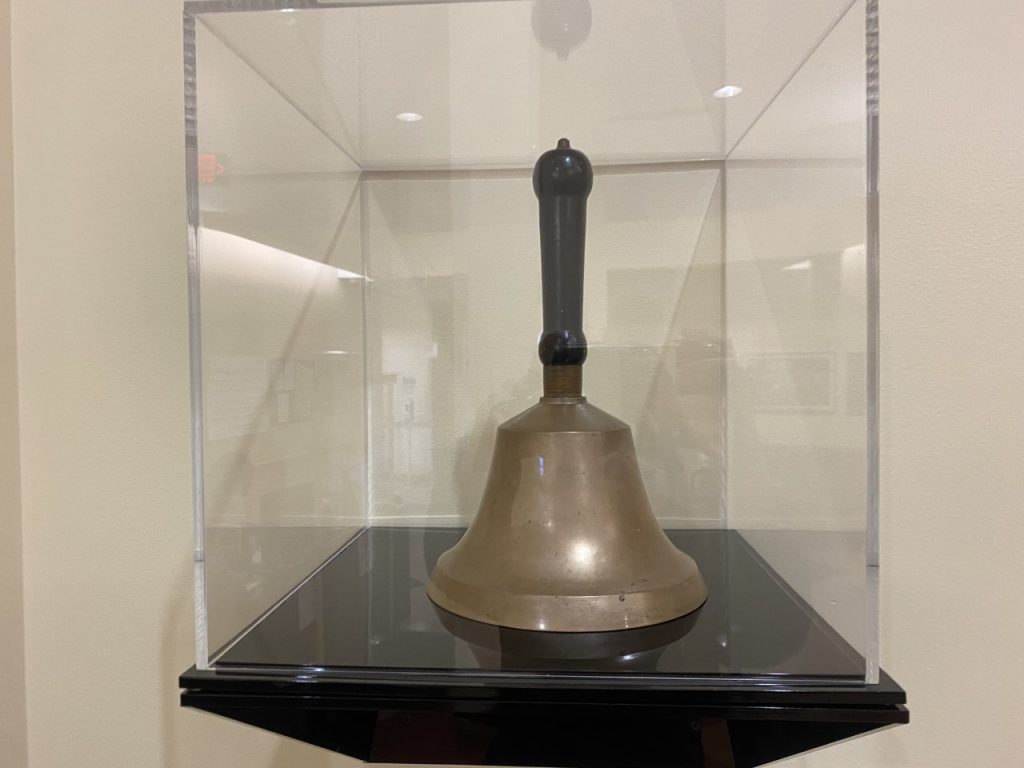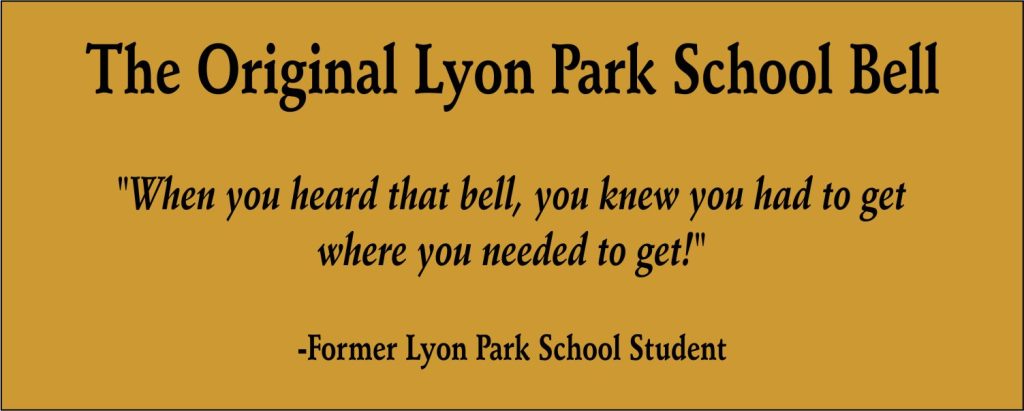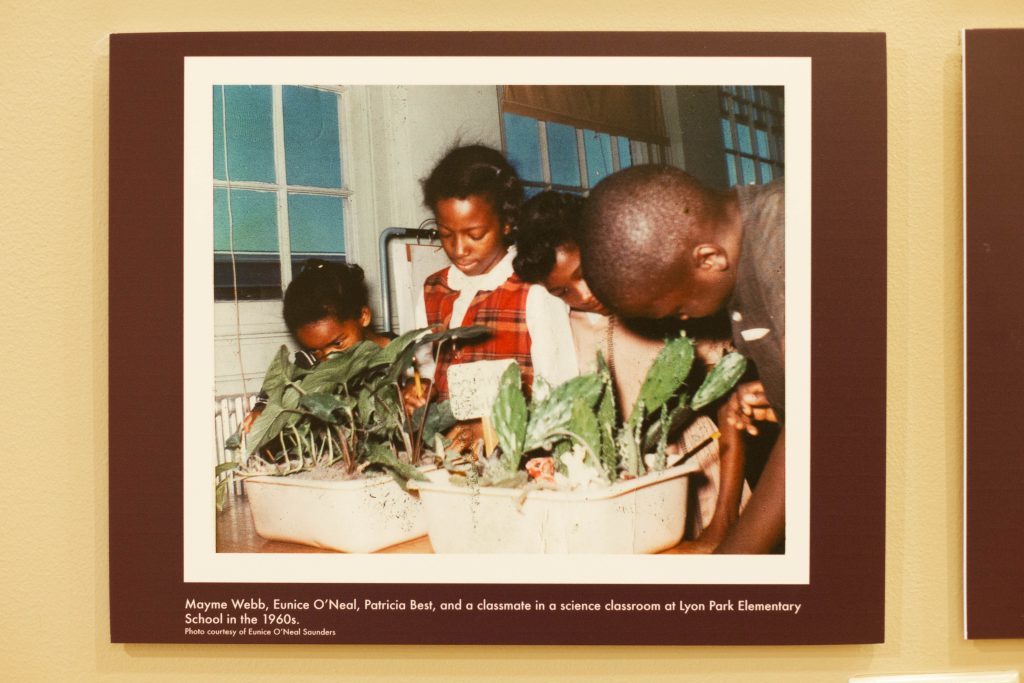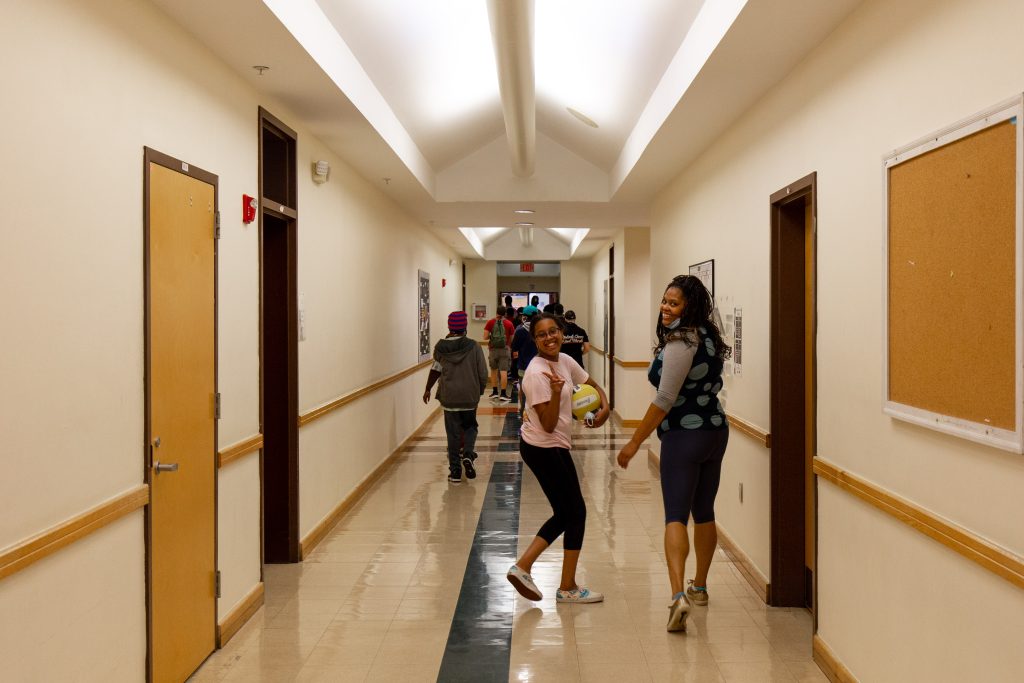Community Leader and Duke Retiree Model Purposeful Collaboration
By Jeannine Sato
There’s a large brass bell in the lobby of the Community Family Life and Recreation Center at Lyon Park. It’s a reminder of the building’s original life as a segregated elementary school in the heart of the West End, a historically Black Durham neighborhood.
A former student visiting the center recently recalled how the bell would ring out across the schoolyard. She paraphrased the plaque that now describes it: “When you heard that bell, you knew you had to get where you needed to get!”


The building’s transformation from school to community center is not the only thing that has evolved in Lyon Park. “Our neighborhood is changing; we are going through gentrification,” said Dosali Reed-Bandele, executive director of the West End Community Foundation, Inc., which administers the center. “We want our center to be the hub of the West End as well as honor those neighbors who have lived and contributed to this community, and we want to welcome our new neighbors while educating them about our history.”
During the past year, Reed-Bandele and her colleagues have begun telling that story in new ways with an updated website, a colorful e-newsletter and other communications tools. They’ve received assistance from Duke University’s Osher Lifelong Learning Institute (OLLI), a community of nearly 1,600 older adults that includes many former faculty members and other Duke retirees.
OLLI member David Jarmul partnered with Reed-Bandele to develop a strategic communications plan and launch initiatives that also included a new brochure, texting service and slogan.
The year-long project “helped our center tell its story more authentically, about both our history and how we now interact with the community,” said Reed-Bandele. “There was success on both ends” of the partnership, she said, providing a model for how other Durham community organizations might partner with OLLI project consultants. “This sets a bar for future work,” she said.

Walking through the center recently, she pointed out its gym, health clinic, senior spaces, computer lab and other facilities. There were children laughing on the playground and new raised-bed gardens. A tree-planting festival and movie matinee for older adults were also in the works.
“We want everyone not just to use the center to walk the track or go to Picasso babies [an early childhood art class], but to understand how this building was vital to the community in the past and has been revitalized to continue serving the community,” Reed-Bandele said. “The only way they are able to do that is through education.”

Reed-Bandele (left) and Jarmul (right) work on the center’s communications.
Reed-Bandele and Jarmul began their collaboration by reaching out and listening to the center’s stakeholders, including West End residents and the foundation’s board and staff — conversations that guided their subsequent plan and activity. They strove to maintain the community’s voice, which is embodied in the new slogan, “Our Community, Our Center.” Reed-Bandele hired a talented young local Black photographer, Thomas “Tommy” Bell, to shoot fresh images for the website.
“(David) being a white male, there needed to be an understanding of the importance of keeping our Black space,” she said.
“This (project) addresses a larger narrative of how Duke and Durham interact,” said Jesse Huddleston, Lyon Park neighbor and Duke alumnus (T’ 2010). “It requires a fair exchange grounded in mutual understanding, openness and trust. It invites people to imagine the other ways in which we can share power, or ways we can posture ourselves to be genuinely open and curious about other people’s experiences in our community.”
Huddleston, who has a long history of local volunteering and organizing, helped propel the project through their current work with the Duke-Durham Neighborhood Partnership (DDNP) within Duke’s Office of Durham and Community Affairs. DDNP’s leader, Mayme Webb-Bledsoe, a former Lyon Park student herself, helped broker the collaboration between the center and OLLI. “It was important to me to identify the right kind of people, both from OLLI and in the community, who would work together well and ensure that a partnership would be mutually beneficial,” she said.

One of the historic photos on display at the center shows Mayme Webb-Bledsoe as a child at left.
OLLI’s Community Engagement Committee was already active in Lakewood and other parts of Durham. It was looking to expand its impact by connecting older volunteers to serve as project consultants for local nonprofits.
“OLLI members have a broad range of skills and professional expertise,” said OLLI director, Chris McLeod. “They are eager to make a difference.”
Webb-Bledsoe said the foundation’s leadership wanted to take a fresh look at its communications. Jarmul, who retired as Duke’s associate vice president for news and communications in 2015 before leaving to serve in the Peace Corps, was interested in assisting. During his 14-year career at Duke, he said, his office was located near the center but felt a world away.
“It’s not my story to tell,” he said. “It’s the center’s story and Dosali takes the lead on that. My job has been to help her think through how she might do it most effectively.”

Students in the community center hall. Photo by Tommy Bell.
He agrees with McLeod about the great potential for more Duke retirees and other older volunteers to share their skills with — and learn from — local nonprofits. “There’s a real opportunity here,” he said. Huddleston added that Jarmul’s experience also models how OLLI participants can partner with community members, “offering their resources and expertise humbly while also following the guidance and leadership of those community partners in Durham.”
Today, the center’s updated website emphasizes both its historical legacy and its eagerness to serve an evolving neighborhood. It says the center “is not just located in its community; it is of its community.” To learn more about the West End Community Foundation and the Community Family Life and Recreation Center, please visit https://thewecf.org. To learn more about the Osher Lifelong Learning Institute, please visit https://learnmore.duke.edu/olli


